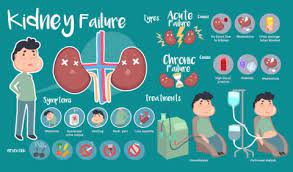Understanding and preventing kidney cancer involves awareness of risk factors, recognizing symptoms, and adopting lifestyle choices that may reduce the likelihood of developing this type of cancer. Here is an overview:
Understanding Kidney Cancer
- Types of Kidney Cancer:
Renal Cell Carcinoma (RCC): The most common type, accounting for about 90% of kidney cancers.
Transitional Cell Carcinoma: Affecting the renal pelvis, similar to bladder cancer.
- Risk Factors:
Age: Kidney cancer risk increases with age.
Gender: Men are at a higher risk than women.
Smoking: Tobacco use is a significant risk factor.
Obesity: Overweight individuals have an elevated risk.
High Blood Pressure: Hypertension is associated with an increased risk.
Family History: A family history of kidney cancer may elevate risk.
Hereditary Conditions: Certain genetic conditions increase susceptibility.
- Symptoms:
Early stages may be asymptomatic.
Symptoms may include blood in the urine, persistent pain in the back or side, unexplained weight loss, fatigue, and fever.
- Diagnostic Tools:
Imaging tests: CT scans, MRIs, and ultrasounds.
Biopsy: Confirmatory procedure if a tumor is suspected.
- Staging:
Determines the extent of cancer spread.
Helps guide treatment decisions.
Preventing Kidney Cancer
- Maintain a Healthy Lifestyle:
Adopt a balanced diet rich in fruits, vegetables, and whole grains.
Exercise regularly to manage weight and promote overall health.
- Quit Smoking:
Tobacco use is a significant risk factor for kidney cancer.
Quitting smoking can reduce this risk.
- Control Blood Pressure:
Manage hypertension through lifestyle changes and medications if necessary.
- Stay Hydrated:
Maintain adequate fluid intake.
Staying hydrated may help prevent kidney stones, which can contribute to kidney cancer risk.
- Limit Occupational Exposure:
Certain occupations involve exposure to toxins or chemicals that may increase the risk of kidney cancer.
- Regular Check-ups:
Routine health check-ups can help detect and address health issues early.
Discuss any concerns or symptoms with a healthcare professional.
- Manage Chronic Conditions:
Effectively manage conditions like diabetes, as they may contribute to kidney cancer risk.
- Genetic Counseling:
Individuals with a family history of kidney cancer or certain hereditary conditions may benefit from genetic counseling and testing.
- Avoid Excessive Analgesic Use:
Prolonged and excessive use of certain pain medications, particularly over-the-counter nonsteroidal anti-inflammatory drugs (NSAIDs), may be associated with an increased risk.
- Occupational Safety: – If working in industries with potential exposure to toxins, follow safety guidelines to minimize risks.
Conclusion
While adopting these preventive measures can reduce the risk of kidney cancer, it’s essential to recognize that some risk factors, such as age and family history, cannot be modified. Regular health check-ups and open communication with healthcare professionals are crucial for early detection and intervention, which can improve outcomes for individuals at risk or already diagnosed with kidney cancer.

